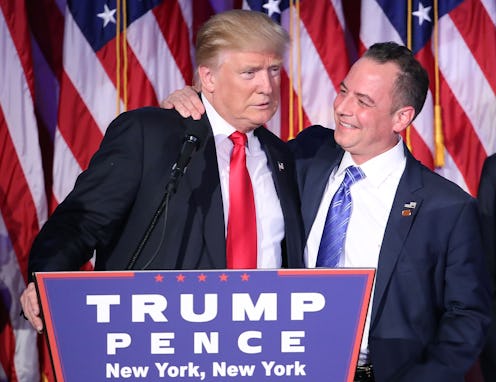News
Reince Priebus Could Be Chief Of Staff
As the reality of an impending Donald Trump presidency sets in, the Republican candidate's campaign staff has officially shifted into transition mode. The president-elect spent the day after his victory inside Trump Tower, meeting with senior campaign and party officials to lay out the details for his cabinet appointments. While New Jersey Gov. Chris Christie and Alabama Sen. Jeff Sessions are leading Trump's transition team, rumors are swirling that Republican National Committee (RNC) Chairman Reince Priebus is Trump's top pick for Chief of Staff.
CBS News and Time magazine are both reporting that Priebus, who has served as the leader of the RNC for the past six years, is "very likely" to become White House Chief of Staff. During Trump's victory speech in the early hours of Nov. 9, the president-elect called Priebus an "all-star," and ceded the microphone for a brief moment, allowing Priebus to thank all those who supported the campaign.
But the relationship between the GOP chairman and the GOP candidate wasn't always so cordial. During the contentious primary season, Trump and Priebus fought openly about the rules regulating how the Republican Party awards convention delegates. Trump warned that if the GOP chairman didn't see things his way, Trump would have him removed from his post — which would have proven difficult, given Priebus' broad popularity within the Republican Party.
By naming Priebus to the powerful chief of staff position, Trump would be trying to extend an olive branch to lifelong Republicans who distanced themselves from the party's nominee this year. As the longest-serving RNC chairman in history, Priebus has deep roots in established Republican circles, and would bring to the position a wealth of knowledge about the inner-workings of standard Republican operations. Originally from Wisconsin, Priebus also has a well-documented friendly working relationship with House Speaker Paul Ryan, who was re-elected on Nov. 8.
Priebus was also a key architect of the GOP's 2012 "autopsy" report, which concluded that the Party of Lincoln needed to become more inclusive to women, people of color, younger and low-income voters if it wanted to survive. Despite that report's conclusion, the RNC chairman dutifully hitched his wagon to a nominee who, according to Politico, ripped that inclusive prescription to shreds over the past 16 months.
During the primary, it was Priebus who convinced most of the GOP hopefuls — including Trump — to sign a "loyalty pledge" that guaranteed none of the candidates would run as third-party independents. The pledge was largely believed to be a fail-safe to prevent a disgruntled Trump from mounting an independent campaign that could cost Republicans the White House.
As it turns out, that pledge was unnecessary. And despite the numerous Republican officials and pundits who refused to endorse Trump's candidacy, it appears that Trump's firebrand, nationalistic rhetoric was exactly what the GOP needed to regain control of both chambers of Congress and the White House. As Speaker Ryan put it in his post-election remarks on Nov. 9, Trump now has a "mandate" to lead a "unified Republican Party" for the next four years.
